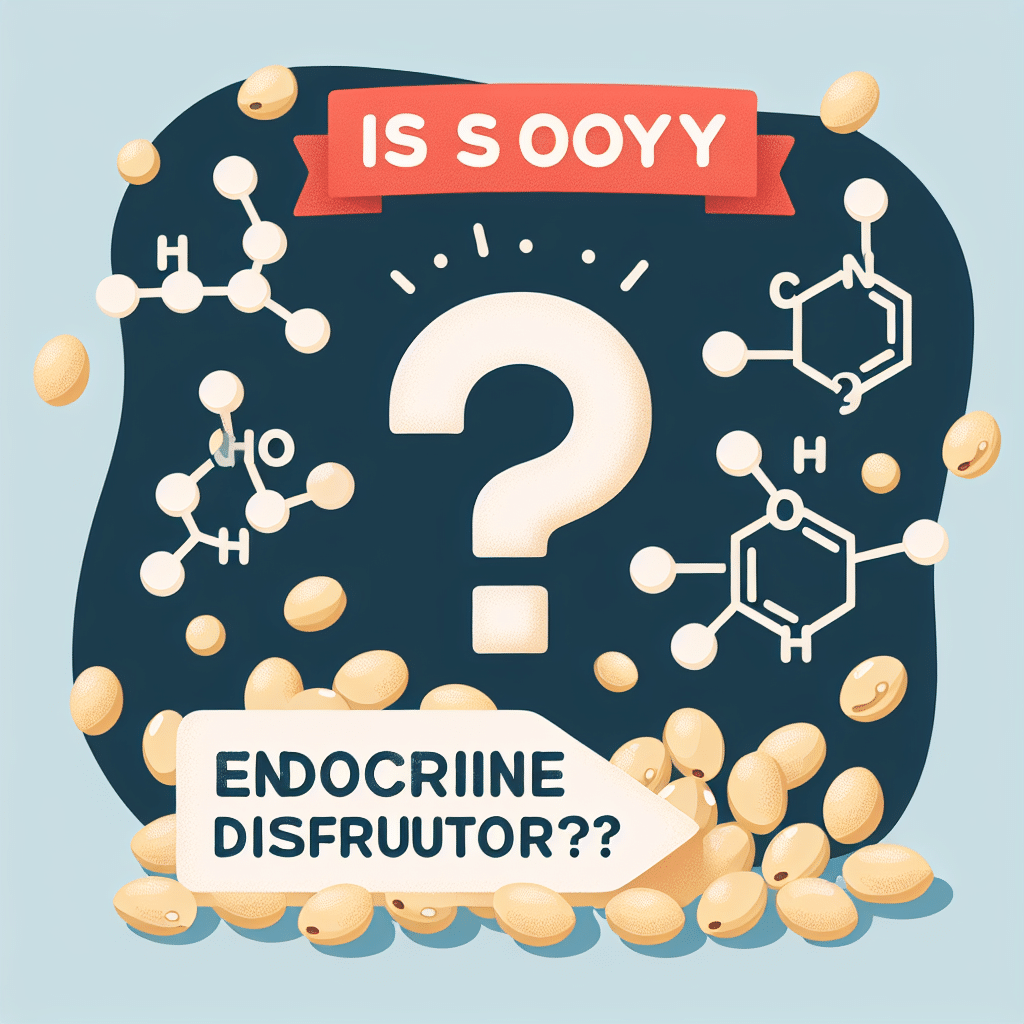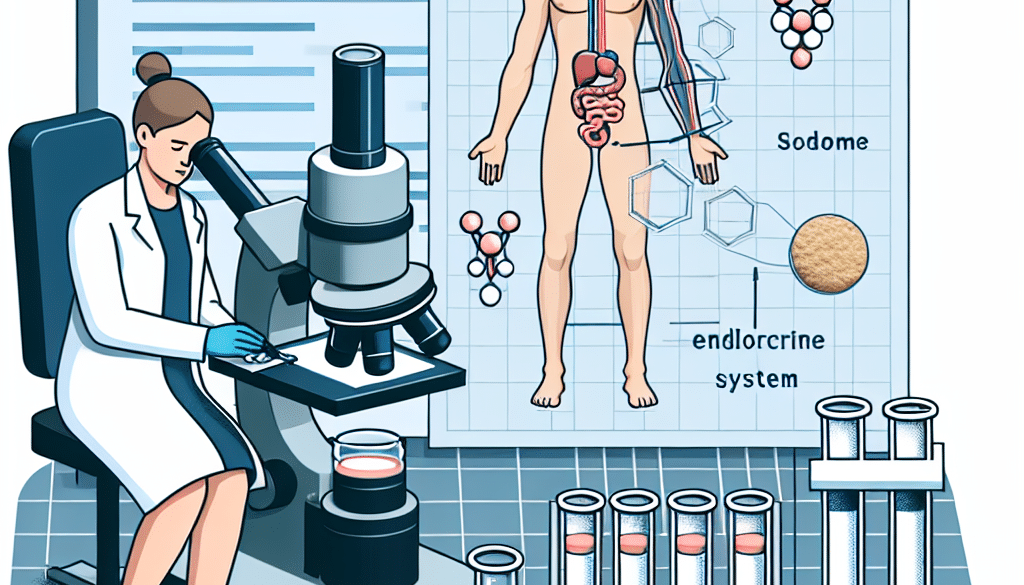Is Soy An Endocrine Disruptor?
-
Table of Contents
- Is Soy an Endocrine Disruptor? Unraveling the Truth
- Understanding Endocrine Disruptors
- The Soy Controversy: Phytoestrogens and Health
- How Soy Isoflavones Interact with the Body
- Research Findings on Soy and Hormonal Balance
- Population Studies and Long-Term Consumption
- Case Studies and Clinical Trials
- Understanding the Risks: Who Should Be Cautious?
- Recommendations for Safe Soy Consumption
- Conclusion: Balancing the Evidence on Soy and Endocrine Health
- Discover ETprotein’s Range of Protein Products
Is Soy an Endocrine Disruptor? Unraveling the Truth

Soy has been a staple in Asian diets for centuries and has gained popularity in Western countries as a plant-based protein source. However, its health implications have been a topic of debate, particularly concerning its potential role as an endocrine disruptor. This article delves into the scientific evidence to explore the relationship between soy consumption and endocrine function.
Understanding Endocrine Disruptors
Endocrine disruptors are chemicals that can interfere with the endocrine system, the network of glands that produce hormones regulating metabolism, growth, sleep, and mood, among other functions. These disruptors can mimic or block hormones, leading to a range of health issues.
The Soy Controversy: Phytoestrogens and Health
Soy contains natural compounds called phytoestrogens, which are plant-derived xenoestrogens that are structurally similar to human estrogen. The primary phytoestrogens in soy are isoflavones, which have been the focus of research on endocrine disruption.
How Soy Isoflavones Interact with the Body
Isoflavones can bind to estrogen receptors in the body, potentially exerting estrogen-like effects. However, they also have anti-estrogenic properties, complicating their overall impact on health.
Research Findings on Soy and Hormonal Balance
Studies on soy’s effects on the endocrine system have yielded mixed results. Some research suggests that soy may have beneficial effects on hormone-related conditions, while other studies raise concerns about its potential to disrupt endocrine function.
- Menopausal Symptoms: Some studies indicate that soy isoflavones may alleviate hot flashes and other menopausal symptoms due to their estrogenic activity.
- Reproductive Health: Research on fertility and menstrual cycles has shown inconsistent results, with some studies suggesting that high soy intake could affect menstrual cycle length and hormone levels.
- Thyroid Function: Soy components may interfere with thyroid hormone production and absorption, but the clinical significance of this effect remains unclear.
- Cancer Risk: The relationship between soy consumption and cancer risk, particularly breast and prostate cancer, is complex. Some evidence suggests that soy may offer protective benefits, while other studies indicate potential risks.
Population Studies and Long-Term Consumption
Observational studies in populations with high soy consumption, such as in Asia, generally do not support the idea that soy acts as an endocrine disruptor. These populations tend to have lower rates of certain hormone-related cancers and other health issues.
Case Studies and Clinical Trials
Clinical trials and case studies provide valuable insights into the effects of soy on the endocrine system. For example, a study on postmenopausal women found that soy supplementation had minimal impact on hormone levels and breast tissue density. However, individual responses to soy can vary, highlighting the need for personalized dietary recommendations.
Understanding the Risks: Who Should Be Cautious?
While the majority of people can consume soy without adverse effects, certain groups may need to exercise caution:
- Individuals with thyroid disorders may need to monitor their soy intake and thyroid function.
- Women with a history of estrogen-sensitive cancers should consult with their healthcare provider regarding soy consumption.
- Infants on soy-based formulas should be monitored, as their developing endocrine systems may be more sensitive to phytoestrogens.
Recommendations for Safe Soy Consumption
For most individuals, moderate soy consumption is considered safe and can be part of a balanced diet. Health organizations suggest that up to three servings of soy per day is generally safe for adults. It is also recommended to choose whole soy foods over highly processed soy derivatives.
Conclusion: Balancing the Evidence on Soy and Endocrine Health
The question of whether soy is an endocrine disruptor does not have a simple yes or no answer. The current body of scientific evidence suggests that moderate soy consumption is unlikely to cause significant endocrine disruption in most people. However, individual factors such as existing health conditions and genetic predispositions can influence how one’s body responds to soy. As with any dietary choice, it is essential to consider personal health needs and consult with healthcare professionals when necessary.
Discover ETprotein’s Range of Protein Products
If you’re looking for alternative protein sources that align with your dietary preferences and health considerations, ETprotein offers a variety of organic bulk vegan proteins. Their products, including rice protein, pea protein, and various seed proteins, provide high-quality, non-GMO, allergen-free options for those seeking to diversify their protein intake without relying on soy.
About ETprotein:
ETprotein, a reputable protein and L-(+)-Ergothioneine (EGT) Chinese factory manufacturer and supplier, is renowned for producing, stocking, exporting, and delivering the highest quality organic bulk vegan proteins and L-(+)-Ergothioneine. They include Organic rice protein, clear rice protein, pea protein, clear pea protein, watermelon seed protein, pumpkin seed protein, sunflower seed protein, mung bean protein, peanut protein, and L-(+)-Ergothioneine EGT Pharmaceutical grade, L-(+)-Ergothioneine EGT food grade, L-(+)-Ergothioneine EGT cosmetic grade, L-(+)-Ergothioneine EGT reference grade and L-(+)-Ergothioneine EGT standard. Their offerings, characterized by a neutral taste, non-GMO, allergen-free attributes, with L-(+)-Ergothioneine purity over 98%, 99%, cater to a diverse range of industries. They serve nutraceutical, pharmaceutical, cosmeceutical, veterinary, as well as food and beverage finished product distributors, traders, and manufacturers across Europe, USA, Canada, Australia, Thailand, Japan, Korea, Brazil, and Chile, among others.
ETprotein specialization includes exporting and delivering tailor-made protein powder and finished nutritional supplements. Their extensive product range covers sectors like Food and Beverage, Sports Nutrition, Weight Management, Dietary Supplements, Health and Wellness Products, and Infant Formula, ensuring comprehensive solutions to meet all your protein needs.
As a trusted company by leading global food and beverage brands and Fortune 500 companies, ETprotein reinforces China’s reputation in the global arena. For more information or to sample their products, please contact them and email sales(at)ETprotein.com today.












